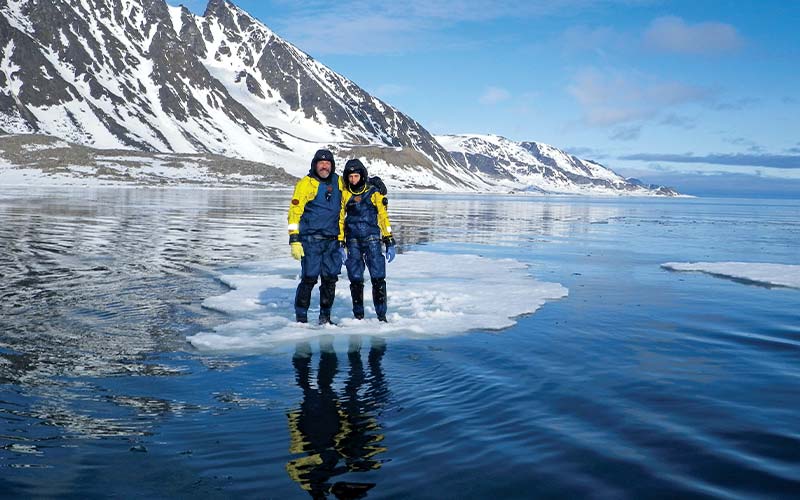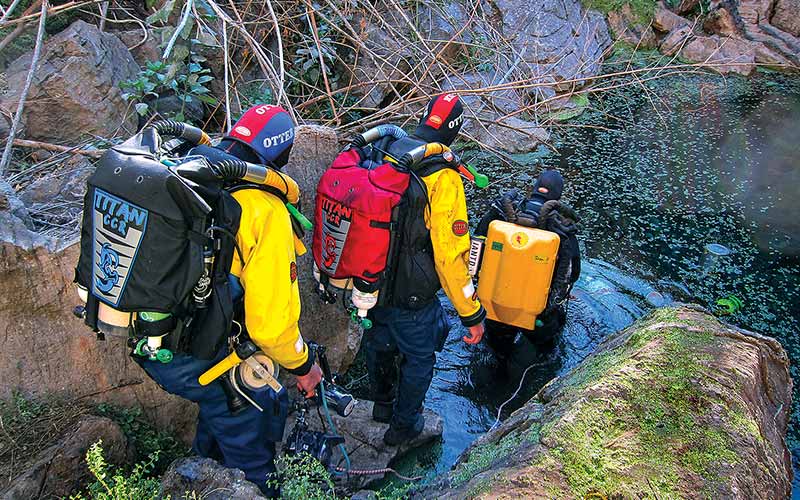Hometown: Fountain Valley, Calif.
Age: 14
Years Diving: 2.5
Favorite Destination: “I love exploring; my favorite destination is somewhere no one has been before … maybe some trench in the middle of the Pacific or the Bermuda Triangle!”
Why I’m a DAN Member: “I feel a lot safer being a part of DAN because if something ever goes wrong in a remote place, DAN would be able to help.”
Evan Bozanic remembers his first wreck dive well: The lionfish, the yellow corals, the warm Fijian water, but mostly he remembers the feeling of soaring around the decks of the wreck like a superhero.
Evan is an explorer drawn to the ultimate profession for explorers: a scientist. He’s not sure what type of scientist he wants to be, but it’s early yet. He loves conducting experiments and is fascinated by much of what he sees – eels, angel sharks and lionfish are all of particular interest to him. But it’s not just for the sake of knowledge that Evan likes to learn about the sea’s denizens – he’s interested in tips for hunting them more successfully, too. Like many young men, stalking prey excites him. Last year, Evan got his first speargun and eagerly recounts tales of catching a kelp bass, his first sheepshead and his largest quarry yet: a five-pound halibut. Like any fisherman, he looks forward to his next catch and hopes it’s a big one. But he’s thoughtful about which fish to shoot, too; his studies in ocean conservation have taught him to respect its inhabitants.

One of his favorite resources for learning about the creatures of the sea is his dad, Jeff Bozanic. Jeff is a dive educator and researcher who holds advanced degrees in oceanography and education, is the author of the textbook “Mastering Rebreathers,” co-author of the “Antarctic Scientific Diving Manual” and a technical diving instructor for nearly 20 years. Although his dad’s dedication to diving has certainly rubbed off on Evan, it is apparent that the younger Bozanic’s interest in diving is truly his own. “He wanted to do this far sooner than I was ready to let him,” says Jeff. Evan was patient, and a few years later when his parents were ready to let him dive, his desire was unflagging. Impressively for such a young diver, Evan’s excitement to get underwater has always been tempered by a conservative approach. His dad describes him as “risk averse” and acknowledges an understanding the two share: Evan has many years ahead of him to explore the depths and there’s no need to try to see everything right away.
It’s easy to forget you’re talking to a teenager when you’re in conversation with Evan; his assessments often provide unique and unexpected insights. Evan recognizes the challenges the ocean faces and knows that to address them, scientists need quality data collection methods. So in 2010 Evan entered the California State Science Fair with the project “Differential Fish Count: Rebreather vs. Open Circuit.” He tested divers’ ability to estimate populations of an overharvested species of fish with open-circuit scuba versus rebreather. He placed third overall. What is perhaps most astounding about his project is that, with the appropriate training and expert supervision, Evan built his own rebreather to conduct the research. Evan is mechanically inclined, but his experience before building the rebreather was limited to taking apart mechanical pencils during class. He likens the process of building a rebreather to putting together a Lego kit. When asked why he couldn’t have used an off-the-shelf rebreather, Evan, ever practical, responded that the rebreathers on the market were all too big.

Like most divers, Evan loves breathing underwater for the calm clarity it brings. “It allows me to forget about school and homework,” he says. But far from having a one track mind, Evan has a large number of activities vying for his time. He divides his time between diving, school, playing guitar, sailing and soccer. Most of his interests aren’t very different from those of his classmates at Tarbut V’Torah Community Day School, but his accomplishments in diving are unique. He appreciates it when his peers ask him about his travels and enjoys sharing what he’s learned about the ocean.
Evan’s latest adventure took him to Svalbard, into cold European waters north of the Arctic Circle. Europe is the fifth continent off which this young explorer has dived. Having already plunged into the seas of Antarctica at age 11, Evan is well on his way to achieve his goal of being the youngest person to dive off all seven continents. Although he makes no bones about how cold such environments can be, he is still drawn to them. The small concentration of humans results in less shy creatures, which permits him closer and more personal observations of the local wildlife. He relates one such encounter: While in Antarctica, Evan watched as a group of small penguins became enthralled with his shoelaces. After a few moments of studying the penguins, he was taken by surprise when a leopard seal appeared from beneath the ice and snatched one of the curious penguins mere feet from where he was sitting. He remembers being dazed for hours afterward – stunned by the close encounter with the food chain.
Evan has gained many insights from his explorations. He is an avid supporter of Antarctic conservation (particularly through Antarctica 2041, an organization dedicated to education about climate change and the preservation of Antartica). He recognizes the vast reserves of the world’s freshwater are in polar ice and the significant impact melting polar ice will have on the world’s island nations. As Evan moves toward his goal of being the youngest person to dive the seven continents, he plans to use the achievement to raise awareness of environmental issues by writing a book about the experience, profiling a specific environmental or social problem unique to each continent. Through Evan’s travels, he’s seen the impacts aggressive resource consumption has on other people and species. He plans to donate the proceeds from his book to organizations dedicated to ocean conservation.
When asked what it will take to reach his generation about the importance of issues like global warming, the young explorer already recognizes the key is to find some way to make people care about it. And how do we do that? “Penguins,” he says, “people love penguins.“
© Alert Diver — Q1 Winter 2013